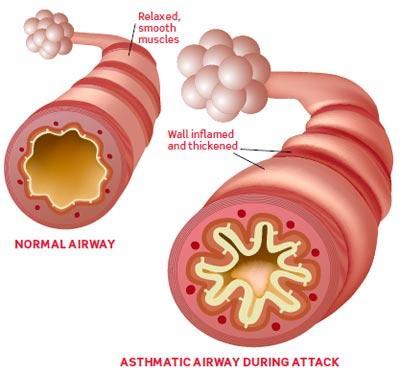 Bronchial asthma is a chronic inflammatory disease of the airways. This occurs due to inflammation in the bronchial tree. There are episodic attacks of wheezing, coughing, shortness of breath and congestion of airways. During the attack of asthma, the swelling occurs in the lining of the air passages and surrounding muscles of the airways become narrow. This leads to the decrease in the airflow that can pass through the airway. It is directly linked with allergies or can be linked to the diseases like chronic nasal polyps, middle ear infections and sinusitis. If allergies and asthma is linked together, then there is the formation of worst conditions as more strong and high dosage is required to control the symptoms of this disease. Some people possess very sensitive airways, in such cases there is the possibility of formation in the chronic conditions in this disease. The symptoms of bronchial asthma can be aggravated by breathing in allergens.
Bronchial asthma is a chronic inflammatory disease of the airways. This occurs due to inflammation in the bronchial tree. There are episodic attacks of wheezing, coughing, shortness of breath and congestion of airways. During the attack of asthma, the swelling occurs in the lining of the air passages and surrounding muscles of the airways become narrow. This leads to the decrease in the airflow that can pass through the airway. It is directly linked with allergies or can be linked to the diseases like chronic nasal polyps, middle ear infections and sinusitis. If allergies and asthma is linked together, then there is the formation of worst conditions as more strong and high dosage is required to control the symptoms of this disease. Some people possess very sensitive airways, in such cases there is the possibility of formation in the chronic conditions in this disease. The symptoms of bronchial asthma can be aggravated by breathing in allergens.
The disease asthma is linked to the eosinophils, mast cells and T lymphocytes. In the body mast cells performs the function of releasing chemicals like histamine. The role of histamine is very crucial as it produces the nasal stuffiness, constriction of airways in asthma and itching in the particular areas during skin allergies. Eosinophils and T lymphocytes are white blood cells which provides the first line defense in these infection. The problems associated with bronchial asthma can become chronic if not treated on time. Balance diet and changes in lifestyle can also be helpful in providing relief in such condition.
Causes- Various respiratory infections like cold, cough etc.
- Allergens such as pollens, dust particles etc.
- Over exercise
- Smoking
- Sudden changes in weather
- Some drugs such as aspirin, beta blockers etc.
- Stress and anxiety
- Shortness of breath
- Congestion or chest tightness
- Wheezing and coughing
Here are the top 5 effective herbs for bronchial asthma, which can be used to reduce the symptoms of the disease;

Tulsi is very common in relieving bronchial asthma in Ayurveda. It is famous as "holy basil" and is effective against various allergic reactions. It kills microbes and reduces the inflammation. So it is used in the condition of bronchial asthma. According to Ayurveda it reduces the kapha dosha, hence it removes phlegm from the bronchioles. It helps in relieving the condition of congestion, which is the major problem in asthma. These all symptoms of bronchial asthma are relieved by tulsi so it is the best supportive remedy for it. The use of 2-3 leaves daily by chewing can be beneficial. It can also be added in the tea.
Turmeric or Haridra is also a beneficial herb in this category. It is used in controlling many diseases related to the digestive, respiratory and circulatory systems. It reduces the microorganisms count like bacteria, fungi and virus. The inflammation and swelling can also be reduced by the use of this herb. The compound of turmeric named curcumin is helpful in reducing the allergic conditions. 'Kaphahara' is the name given by Ayurveda to Haridra. This means the removal of kapha i.e. phlegmatic condition. Routine use of turmeric in daily diet can be useful. The powder can be used in warm milk to reduce the impact of asthmatic conditions.
The use of black pepper is being done by centuries to get benefit in various bronchial diseases. It has been used to prepare tonics for cold and cough. It helps in expelling out the mucous and phlegm, due to the presence of excess kapha dosha. It is very useful in many respiratory problems like bronchitis whooping cough, sinus, congestion and breathing difficulties. Useful in sinusitis and nasal congestion. Beneficial in removing mucus and phlegm blockages from the respiratory tract area, thus provides relief in the asthmatic conditions. The use of warm milk with pinch of black pepper can be beneficial in asthmatic conditions.
The use of garlic is very important and well explained in Ayurveda. Garlic is an immune booster and can be used to relief many symptoms related to asthma. The compounds allicin and sulfhydryl present in garlic are important in dealing with such diseases. These compounds list garlic among the best herbs against asthma and respiratory diseases. If garlic is incorporated in the daily diet, it can strengthen the immune system and creates the barrier for invading microbes. It can be directly used by adding soups or dishes
Ginger is also very renowned herb used since centuries to deal with many asthmatic, allergies and respiratory diseases. The use of ginger tea during the respiratory infections is very common. It possesses the quality of preventing and relieving colds or flu. It possesses the quality of antimicrobial, which helps in protecting the body from foreign microbes. These microbes can cause chronic infections in the body. Ginger tea or chopped or grated can be used. It can be added into various dishes to consume regularly. Also by keeping a piece of ginger in the mouth, can be beneficial in treating cold and cough.

